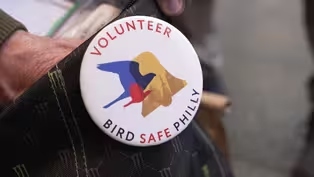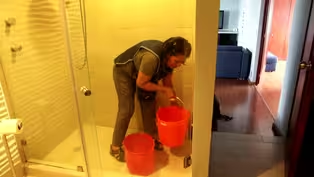
Study shows why LGBTQ+ people may have higher cancer risk
Clip: 6/15/2024 | 5m 23sVideo has Closed Captions
Study highlights why LGBTQ+ people may be at greater risk for cancer
A first-of-its-kind report from the American Cancer Society is shedding new light on cancer risks for LGBTQ+ people. It found that some LGBTQ+ populations are more likely to have cancer risk factors, less likely to be screened for certain types of cancer, and face barriers to high-quality health care. John Yang speaks with Dr. William Dahut, chief scientific officer for the ACS, to learn more.
Problems playing video? | Closed Captioning Feedback
Problems playing video? | Closed Captioning Feedback
Major corporate funding for the PBS News Hour is provided by BDO, BNSF, Consumer Cellular, American Cruise Lines, and Raymond James. Funding for the PBS NewsHour Weekend is provided by...

Study shows why LGBTQ+ people may have higher cancer risk
Clip: 6/15/2024 | 5m 23sVideo has Closed Captions
A first-of-its-kind report from the American Cancer Society is shedding new light on cancer risks for LGBTQ+ people. It found that some LGBTQ+ populations are more likely to have cancer risk factors, less likely to be screened for certain types of cancer, and face barriers to high-quality health care. John Yang speaks with Dr. William Dahut, chief scientific officer for the ACS, to learn more.
Problems playing video? | Closed Captioning Feedback
How to Watch PBS News Hour
PBS News Hour is available to stream on pbs.org and the free PBS App, available on iPhone, Apple TV, Android TV, Android smartphones, Amazon Fire TV, Amazon Fire Tablet, Roku, Samsung Smart TV, and Vizio.
Providing Support for PBS.org
Learn Moreabout PBS online sponsorshipJOHN YANG: A first of its kind report from the American Cancer Society is shedding new light on cancer risks for LGBTQ people.
The finds that some LGBTQ populations are more likely to have cancer risk factors like smoking, heavy alcohol use or excess body weight.
Transgender people are less likely to be screened for cervical, colorectal and prostate cancer.
And LGBTQ people continue to face barriers to high quality health care, including discrimination.
Dr. William Dahut is the American Cancer Society's Chief Scientific Officer.
Dr. Dahut, this is the first time this has being done, this is being looked into.
Why now?
Why did you decide to do this now?
DR. WILLIAM DAHUT, American Cancer Society: Well, thanks very much for having me on today.
It's really a great question.
You know, it's really important to know that this was really a way for us to get a clue to the cancer risk to this population.
Cancer communities, cancer registries do not collect data for cancer deaths, cancer incidents, based on sexual orientation or gender.
So I think this is really important to begin to understand is the risk different.
So we begin to capture that information in a much more critical way.
JOHN YANG: Were there things on your findings that surprised you?
And what do you think are the key takeaways from this report?
DR. WILLIAM DAHUT: Yes, a couple of things are really important.
I think, first of all, you really need to disaggregate the data by the population.
This isn't really one homogeneous group.
So certain groups, I think, as you commented on early on, looking at bisexual women in their 40s and 50s.
You know, much higher alcohol use, obesity use, tobacco use, these are real risk factors for cancers.
Other things were also interesting.
You know, overall, the vaccination rates were actually fairly similar to other populations and cisgender populations.
I think that was good news.
Screening rates are actually are fairly good, except, as you mentioned, and transgender men, where there's much fewer screenings done for colorectal cancer in transgender men with the cervix of cervical cancer and prostate cancer.
So there's a lot of variety, I think.
JOHN YANG: The risk factors, are these directly related to being gay or lesbian or transgender?
Or is it also part of because of the stress that comes along with the stigma of being in those communities?
DR. WILLIAM DAHUT: Well, the risk factors themselves are really risk factors for anybody to have cancer.
You know, our data, there's about 40 to 42 percent of cancers are actually preventable.
And probably the risk of dying from cancer is actually -- the risk prevention, it's much probably easier to prevent die from cancer by changing behavior.
And so we focus on those behaviors, you know, alcohol use, obesity, tobacco use, and we did see them higher in this population, particularly in the bisexual woman.
And so that gives us concern that there'll be a higher risk of cancer rates and deaths.
And then if folks are not seeking medical care because of biases, then there's likelihood that people present with even more advanced diseases or outcomes.
JOHN YANG: You mentioned biases, how much of this has to do with the culture of maybe society or medical care?
There was a long with this report, there was a study came out from Dana-Farber Cancer Institute that said 80 percent of LGBTQ cancer patients they surveyed, said they didn't get appropriate preventative screening, 34 percent said their partners felt welcome in the part of their treatment, and only 4 percent of the partners said they felt respected by caregivers.
DR. WILLIAM DAHUT: Yes, it really is concerning.
There was one fact that the paper pointed out that only about 25 percent of current medical students actually felt comfortable and taking care of transgender individuals.
And 30 percent, there was really a sense of potential perceived bias, actually, when you thought about it.
So I think seeing this hesitancy to seek medical care for real and perceived bias can actually lead to much poor outcome.
You know, even if you're screened on time, if you have symptoms, you don't -- if you're not seeing your symptoms, you're much more likely to present with more advanced disease.
So there clearly are personal concerns by people from this community.
JOHN YANG: What lessons can be learned from this and what things can be done to overcome these problems?
DR. WILLIAM DAHUT: Well, I think number one, the first lesson is I think we need more data.
We need data actually on true cancer incidence and mortality in the LGBTQ population.
So that's important.
And secondly, the same things that are likely to drive risk for all folks, we need to focus in on this population to, you know, ensuring people have a normal healthy weight, exercise, don't smoke, and decrease alcohol use.
And then really begin to educate our students, our interns, our residents, that's really to have a much more inclusive welcoming attitude because if we actually push people away, the outcomes of particularly in cancer could really be devastating.
JOHN YANG: Dr. William Dahut of the American Cancer Society, thank you very much.
DR. WILLIAM DAHUT: Yes.
Thanks so much for having me.
How Philadelphians are protecting birds from window crashes
Video has Closed Captions
Clip: 6/15/2024 | 9m 17s | How Philadelphians are working to protect birds from deadly window collisions (9m 17s)
Why U.S. domestic workers lack basic labor protections
Video has Closed Captions
Clip: 6/15/2024 | 5m 31s | Why U.S. domestic workers have fewer labor protections than other employees (5m 31s)
Providing Support for PBS.org
Learn Moreabout PBS online sponsorship
- News and Public Affairs

FRONTLINE is investigative journalism that questions, explains and changes our world.

- News and Public Affairs

Amanpour and Company features conversations with leaders and decision makers.












Support for PBS provided by:
Major corporate funding for the PBS News Hour is provided by BDO, BNSF, Consumer Cellular, American Cruise Lines, and Raymond James. Funding for the PBS NewsHour Weekend is provided by...

